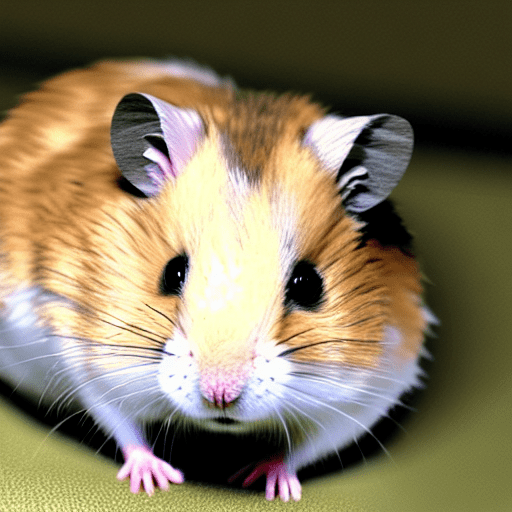Why is My Hamster Sleeping So Much? Discover the Surprising Reasons
Your hamster may be sleeping so much due to stress or illness, so it’s important to monitor its behavior and consult a veterinarian if necessary.
However, it can be concerning if you notice that your beloved furry friend is sleeping excessively. While hamsters do have a tendency to sleep during the day and be more active at night, unusually long periods of slumber could indicate an underlying issue.
Stress is one possible reason for increased sleep, as changes in environment or handling can cause your hamster to feel anxious or overwhelmed. Additionally, illness might be the culprit, as certain ailments can lead to lethargy and increased sleep. To ensure your hamster’s well-being, it is crucial to observe its behavior and seek professional advice if you have concerns.
Understanding The Natural Sleep Patterns Of Hamsters
Hamsters have a natural sleep pattern that differs from humans. Understanding their sleep patterns is crucial for their health and well-being. Just like humans, hamsters have different sleep cycles throughout the day and night. They are nocturnal animals, which means they are more active during the night. They tend to sleep during the day and become livelier during the evening and early morning. Hamsters generally need around 14 hours of sleep per day, although this can vary depending on the individual hamster. It is important to provide them with a suitable sleeping environment, such as a quiet and dark space. Interrupting their sleep can disrupt their natural rhythm and make them more prone to stress and health issues.
Environmental Factors Influencing Hamster Sleep
Environmental factors play a crucial role in determining the sleeping patterns of hamsters. Creating a comfortable sleeping environment is essential to ensure that your hamster gets sufficient rest. One important factor to consider is the temperature of the surroundings. Hamsters prefer cool temperatures, ideally ranging between 65 to 75 degrees Fahrenheit. In a warm and humid environment, hamsters may not sleep well and could become stressed. Additionally, lighting conditions also impact hamster sleep. Hamsters are nocturnal creatures, meaning they are most active during the night. Therefore, it’s crucial to provide a dark and quiet sleeping space for your hamster during the day, as excessive light and noise can disrupt their sleep patterns. In conclusion, by taking care of the environmental factors influencing hamster sleep, such as maintaining the right temperature and providing a suitable lighting environment, you can ensure that your pet gets the necessary rest it needs for a healthy and happy life.
Diet And Its Impact On Hamster Sleep
A hamster’s nutrition is closely linked to their sleep patterns. Providing your hamster with a well-balanced diet can significantly improve the quality and duration of their sleep. Certain foods are known to promote healthy sleep for hamsters.
| Foods that promote healthy sleep for hamsters |
|---|
| Fruits and vegetables – Incorporating a variety of fresh fruits and vegetables into your hamster’s diet can help regulate their sleep cycle. These foods are rich in vitamins, minerals, and antioxidants that can aid in promoting restful sleep. |
| High-quality hamster pellets – Opt for pellets that contain a suitable balance of proteins, carbohydrates, and fats. These pellets provide essential nutrients and help keep your hamster satisfied, ensuring a good night’s sleep. |
| Herbs and supplements – Certain herbs like chamomile and valerian root have calming effects and can promote relaxation and sleep in hamsters. Consult a veterinarian to determine the appropriate dosage and administration of these supplements. |
| Avoiding sugary and fatty foods – Excessive consumption of sugary and fatty foods can disrupt your hamster’s sleep. These foods may lead to weight gain and other health issues that can negatively affect their sleep patterns. |
By prioritizing a well-rounded diet for your hamster and including sleep-promoting foods, you can ensure they get the rest they need for optimal health and well-being.
Health Issues That May Cause Excessive Sleep In Hamsters
Health issues that may cause excessive sleep in hamsters Identifying signs of illness in hamsters is crucial to ensure their well-being. One common health condition that affects hamster sleep is respiratory infections. If your hamster is sleeping more than usual and displaying symptoms such as runny nose, sneezing, or labored breathing, it could be indicative of a respiratory infection. Another health concern is a parasitic infestation which can lead to excessive sleep. If you notice your hamster scratching excessively or if you see mites or fleas on their fur, it’s important to seek veterinary care. Gastrointestinal issues, such as wet tail or diarrhea, can also disrupt a hamster’s sleep patterns. This is often accompanied by other symptoms like weight loss, bloating, or a lack of appetite. Additionally, abnormal growths or tumors can affect a hamster’s sleep. Look out for any unusual lumps or bumps on their body and consult a veterinarian if you notice anything concerning. Lastly, old age is a factor that can contribute to increased sleep in hamsters. As hamsters age, their activity levels naturally decline, resulting in more time spent sleeping. It’s important to differentiate normal aging from potential health issues by observing any accompanying symptoms.
Stress And Its Effect On Hamster Sleep
Stress can significantly impact a hamster’s sleep patterns, leading to increased sleeping durations. It is crucial for hamster owners to recognize potential stressors that may be affecting their pet’s sleep. Common stressors for hamsters include loud noises, excessive handling, changes in their environment, and the presence of predators such as other pets. By identifying and minimizing these stressors, owners can help improve their hamster’s sleep quality. One way to manage stress in hamsters is by providing them with a quiet and safe environment. This can be achieved by placing their cage in a calm area of the house, away from noisy appliances or high traffic areas. Additionally, providing them with hiding spots, such as tunnels or small houses, can give them a sense of security and help reduce stress. Another important factor in managing stress is ensuring that hamsters have proper mental and physical stimulation. This can be achieved through providing them with plenty of toys, such as tunnels, chew toys, and exercise wheels. A varied and enriching environment can help keep hamsters engaged and prevent boredom-induced stress. Regular interaction with a trusted owner can also help reduce stress in hamsters. However, it is important to handle them gently and avoid excessive handling, as this can be stressful for them. Instead, opt for short and gentle interactions.
| Recognizing Stressors in Hamsters |
|---|
| Loud noises |
| Excessive handling |
| Changes in environment |
| Predators (other pets) |
By identifying and reducing stressors, providing a conducive environment, and offering appropriate mental and physical stimulation, hamster owners can help ensure their pets have a better quality of sleep.
Age And Sleep Patterns In Hamsters
Sleep Disturbances And How To Address Them
Sleeping is an essential part of a hamster’s daily routine, but it can be concerning if you notice your furry friend sleeping excessively. Sleep disturbances in hamsters can occur due to various reasons such as age, illness, stress, or environmental factors. If you are dealing with interrupted sleep in your hamster, there are a few things you can do to address the issue. First , make sure your hamster’s sleeping area is quiet, dark, and comfortable, as these factors contribute to a good sleep routine. Second, establish a consistent daily routine for your hamster, including regular meals, playtime, and cleaning. This can help regulate their sleep patterns. Third, ensure that your hamster’s cage is clean and well-ventilated, as a dirty or improper environment can disrupt sleep. Finally, consult a veterinarian if you suspect any underlying health issues affecting your hamster’s sleep. By following these tips, you can help improve your hamster’s sleep routine and ensure their overall well-being.
| Tips for improving a hamster’s sleep routine: |
| – Create a quiet and dark sleeping area |
| – Ensure the cage is clean and well-ventilated |
| – Follow a consistent daily routine |
| – Consult a veterinarian for any health concerns |
When To Consult A Veterinarian About Hamster Sleep
When to consult a veterinarian about hamster sleep: Hamsters are naturally nocturnal animals and tend to sleep during the day. However, if you notice excessive sleepiness in your hamster, it might be a cause for concern. There are certain signs that indicate a need for professional help. If your hamster is sleeping more than usual, lacks energy, has a decreased appetite, appears disinterested in activities, or displays changes in behavior, it is advisable to consult a qualified veterinarian for hamster care. When choosing a veterinarian for your hamster, it is essential to find one with experience and knowledge in small animal care. Look for a veterinarian who specializes in exotic pets or has specific expertise in treating hamsters. Ask for recommendations from other hamster owners or local pet stores. Ensure that the veterinarian is reliable, trustworthy, and available for emergency situations. Your hamster’s well-being is important, so don’t hesitate to seek professional help if needed.
Frequently Asked Questions For Why Is My Hamster Sleeping So Much
Why Is My Hamster Sleeping So Much?
Hamsters are nocturnal animals, meaning they are most active during the night. Sleeping for extended periods during the day is normal behavior for hamsters. However, if your hamster is excessively sleeping or showing other signs of illness, it’s best to consult with a veterinarian.
Could Excessive Sleepiness be Causing my Hamster to Lose Hair?
Could Excessive Sleepiness be Causing my Hamster to Lose Hair? Hamster hair loss causes and solutions should be explored if your pet exhibits excessive sleepiness and shows signs of hair loss. While excessive sleepiness may not directly cause hair loss in hamsters, it could be indicative of an underlying health issue. Common causes include parasites, allergies, stress, or hormonal imbalances. It is essential to consult a veterinarian for an accurate diagnosis and appropriate treatment options.
Conclusion
It is normal for hamsters to sleep a lot due to their natural sleep patterns and instincts. However, excessive sleep could indicate underlying health issues, stress, or boredom. By observing your hamster’s behavior, providing a suitable environment, and consulting a veterinarian if necessary, you can ensure your furry friend stays healthy and happy.
Remember, a well-rested hamster is a happy hamster.

